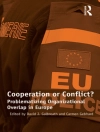This book introduces you to the key issues in contemporary studies on Terrorism. Its interdisciplinary approach provides a unique intellectual rigour which introduces readers to cutting-edge research.
Bringing together chapters contributed by members of the Terrorism and Political Violence Association network, it offers an insight into a variety of traditional and critical perspectives. It also equips Undergraduate and Postgraduate students with the study skills needed to succeed in coursework and assignments, especially dissertation work.
Drawing on the expertise of TAPVA members, this book:
- Explores contemporary issues, such as drone warfare, state violence, children and political violence, cyber-terrorism and de-radicalisation.
- Features case studies drawn from a range of international examples, lists of further reading, key concepts and questions for use in seminars and private study.
- Provides you with study skills content designed to help you complete your dissertation.
This is the perfect textbook to guide you through your studies in terrorism, political violence, international security and strategic studies.
Innehållsförteckning
SECTION A: APPROACHING THE STUDY OF TERRORISM AND POLITICAL VIOLENCE
Locating Terrorism Studies – Simon Mabon
Terrorism and Ethics – Gilberto Algar-Faria
A History of Terrorism: Ideology, Tactics and Organization – Pola Zafra-Davis
Defining Cyberterrorism – Lee Jarvis and Stuart Mc Donald
Essay 1: A Critical Approach: Violence, ‘Victims’ and ‘Innocents’ – Marie Breen-Smyth and Samantha Cooke
Essay 2: A Critical View of Critical Terrorism Studies – James Lutz
Essay 3: The Global War on Terror and State Terrorism – Michael Stohl
SECTION B: UNDERSTANDING TERRORISM
The ′Root Causes′ of Terrorism – Nina Musgrave
Supporting Terrorism – Nicole Ives-Allison
Terrorism, Communication and the Media – Cristina Archetti
Essay 4: IEDs, Martyrs, Civil Wars, and Terrorists – Caroline Kennedy-Pipe
Essay 5: Towards Global Jihadism – Bill Braniff and Assaf Moghadam
Essay 6: Living with Terror, not Living in Terror: The Impact of Chronic Terrorism on Israeli Society – Dov Waxman
SECTION C: HOW TERRORISM ENDS
How Terrorism Ends – Sarah Marsden
Conflict Resolution and Terrorists as Spoilers – Sophie Whiting
Individual Disengagement from Terrorist Groups – Paul Gill, Noemie Bouhana and John Morrison
Essay 7: De-Radicalization, Disengagement and the Attitudes-Behavior Debate – Gordon Clubb
Essay 8: Drone Warfare – Michael Boyle
SECTION D: RESOURCES
Resource 1: Study Skills for Dissertations, Essays and Exams – Terry Hathaway
Resource 2: Conducting Field Research on Terrorism – Adam Dolnik
Om författaren
Simon Mabon is a lecturer in international relations at the University of Lancaster. He is the author of Saudi Arabia and Iran: Soft Power Rivalry in the Middle East (I.B. Tauris, 2013), Hizballah: From Islamic Resistance to Government (Praeger, 2014, with Gordon Clubb and James Worrall) and British Foreign Policy (Routledge, 2015, with Mark Garnett). He is Director of the Richardson Institute and a research associate with the Foreign Policy Centre.












